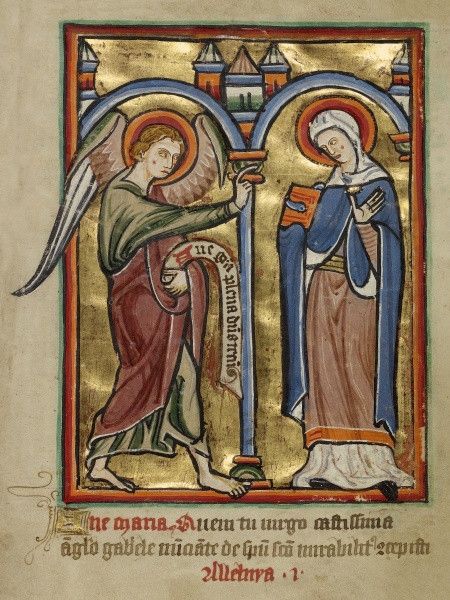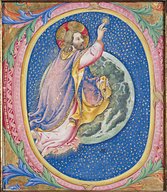English, 12th c.
Mount Calvary Church
Eutaw Street and Madison Avenue
Baltimore, Maryland
A Parish of the Roman Catholic Personal Ordinariate of St. Peter
Rev. Albert Scharbach, Pastor
Advent IV
Music for Saturday December 23, 4:30 PM Sung Mass
Prelude
Nun komm, der Heiden Heiland, Johann Sebastian Bach
Common
Kyrie, Sanctus, Agnus Dei, Merbecke
Hymns
O come, o come Emmanuel
Creator of the stars of night
Anthems
Ne timeas, Maria, Tomás Luis de Victoria
There is no rose, anon
Postlude
Toccata on ‘Creator Alme Siderum’, Pietro Yon (1886-1943)
___________________________________
Prelude
Nun komm, der Heiden Heiland, Johann Sebastian Bach
“Nun komm, der Heiden Heiland” (original: “Nu kom der Heyden heyland”, English: “Now come, Saviour of the heathens”) is a Lutheran chorale of 1524 with words written by Martin Luther, based on Veni redemptor gentium by Ambrose. It was printed in the Erfurt Enchiridion of 1524. The chorale was used as the prominent hymn for the first Sunday of Advent for centuries. It was used widely in organ settings by Protestant baroque composers, most notably Johann Sebastian Bach: he set it as the opening chorale prelude BWV 599 of Orgelbüchlein.
Here it is by a Polish organist.
Common
Kyrie, Sanctus, Agnus Dei, Merbecke
Hymns
O Come, o come, Emmanuel is a translation by the Anglican priest John Mason Neale (1818–1866) of the Latin hymn Veni, veni Emmanuel which is in turn a paraphrase of the seven “O’ antiphons, which are sung before and after the Magnificat on the seven days before Christmas.
O come, O come, Emmanuel,
And ransom captive Israel,
That mourns in lonely exile here
Until the Son of God appear.
Rejoice! Rejoice! Emmanuel
Shall come to thee O Israel!O come, Thou Wisdom from on high,
Who ord’rest all things mightily;
To us the path of knowledge show,
And teach us in her ways to go.
Rejoice! Rejoice! Emmanuel
Shall come to thee O Israel!O come, O come, Thou Lord of might,
Who to Thy tribes on Sinai’s height
In ancient times didst give the Law
In cloud and majesty and awe.
Rejoice! Rejoice! Emmanuel
Shall come to thee O Israel!O come, Thou Branch of Jesse’s tree,
Free them from Satan’s tyranny
That trust Thy mighty pow’r to save,
And give them vict’ry o’er the grave.
Rejoice! Rejoice! Emmanuel
Shall come to thee O Israel!O come, Thou Key of David, come,
And open wide our heav’nly home;
Make safe the way that leads on high,
And close the path to misery.
Rejoice! Rejoice! Emmanuel
Shall come to thee O Israel!O come, Thou Dayspring from on high,
And cheer us by Thy drawing nigh;
Disperse the gloomy clouds of night,
And death’s dark shadows put to flight.
Rejoice! Rejoice! Emmanuel
Shall come to thee O Israel!O come, Desire of nations, bind
In one the hearts of all mankind;
Bid Thou our sad divisions cease;
And be Thyself our King of Peace.
Rejoice! Rejoice! Emmanuel
Shall come to thee O Israel!
Here is King’s College.
Here is a more or less straightforward version.
This hymn has entered into popular culture.
Here is are the male voices of Chanticleer.
Here is a version for children’s choir+.
Here is the Mormon Tabernacle Choir.
Here is Enya.
Here is a heavy metal version (I think; I am not an expert on such matters) by King and Country.
Her is Red Mountian Music.
And of course the Swingles.
and Pentatonix.
A nice version for piano and cello. I admire players who can make the cello sing.
VENI veni, Emmanuel
captivum solve Israel,
qui gemit in exsilio,
privatus Dei Filio.R: Gaude! Gaude! Emmanuel,
nascetur pro te Israel!Veni, O Sapientia,
quae hic disponis omnia,
veni, viam prudentiae
ut doceas et gloriae.Veni, veni, Adonai,
qui populo in Sinai
legem dedisti vertice
in maiestate gloriae.Veni, O Iesse virgula,
ex hostis tuos ungula,
de specu tuos tartari
educ et antro barathri.Veni, Clavis Davidica,
regna reclude caelica,
fac iter tutum superum,
et claude vias inferum.Veni, veni O Oriens,
solare nos adveniens,
noctis depelle nebulas,
dirasque mortis tenebras.Veni, veni, Rex Gentium,
veni, Redemptor omnium,
ut salvas tuos famulos
peccati sibi conscios.
Here are the Gesualdo Six.
Here are the O Antiphons:
O Sapientia, quae ex ore Altissimi prodiisti,
attingens a fine usque ad finem,
fortiter suaviterque disponens omnia:
veni ad docendum nos viam prudentiae.O Wisdom, coming forth from the mouth of the Most High,
reaching from one end to the other,
mightily and sweetly ordering all things:
Come and teach us the way of prudence.
O Adonai, et Dux domus Israel,
qui Moysi in igne flammae rubi apparuisti,
et ei in Sina legem dedisti:
veni ad redimendum nos in brachio extento.O Adonai, and leader of the House of Israel,
who appeared to Moses in the fire of the burning bush
and gave him the law on Sinai:
Come and redeem us with an outstretched arm.
Isaiah had prophesied:
O Radix Jesse, qui stas in signum populorum,
super quem continebunt reges os suum,
quem Gentes deprecabuntur:
veni ad liberandum nos, jam noli tardare.O Root of Jesse, standing as a sign among the peoples;
before you kings will shut their mouths,
to you the nations will make their prayer:
Come and deliver us, and delay no longer.
Isaiah had prophesied:
O Clavis David, et sceptrum domus Israel;
qui aperis, et nemo claudit;
claudis, et nemo aperit:
veni, et educ vinctum de domo carceris,
sedentem in tenebris, et umbra mortis.O Key of David and sceptre of the House of Israel;
you open and no one can shut;
you shut and no one can open:
Come and lead the prisoners from the prison house,
those who dwell in darkness and the shadow of death.O Oriens,
splendor lucis aeternae, et sol justitiae:
veni, et illumina sedentes in tenebris, et umbra mortis.O Dayspring,
splendour of light eternal and sun of righteousness:
Come and enlighten those who dwell in darkness and the shadow of death.O Rex Gentium, et desideratus earum,
lapisque angularis, qui facis utraque unum:
veni, et salva hominem,
quem de limo formasti.O King of the nations, and their desire,
the cornerstone making both one:
Come and save the human race,
which you fashioned from clay.O Emmanuel, Rex et legifer noster,
exspectatio Gentium, et Salvator earum:
veni ad salvandum nos, Domine, Deus noster.
English:O Emmanuel, our king and our lawgiver,
the hope of the nations and their Saviour:
Come and save us, O Lord our God.
Her is the Gregorian O Sapientia.
Here is a modern arrangement of all seven antiphons.
O Sapientia
O Adonai
O Radix Jesse )
O Clavis David
O Oriens
O Rex gentium
O Emmanuel
If read backwards, the letters form a two-word acrostic, “Ero cras,” meaning “I will be present tomorrow.”
All of the Latin apostrophes to the coming Messiah are from the Old Testament except “Emmanuel,” which is found both in Isaiah 7:14 and Matthew 1:23. The meaning of the names, like that of all the acts of God, is not fully revealed until His final act and name: Emmanual, God-with-us.
_______________________________
Creator of the stars of night is a translation, also by John Mason Neale, of the Latin hymn Conditor alme siderum, an anonymous text from the 7th century, used at Vespers during Advent. The themes of preparation for both the coming of Christ at Christmas and the Second Coming on the last day of judgment are woven throughout the verses, along with the theme of light in darkness.
Creator of the stars of night,
Thy people’s everlasting light,
O Christ, thou Saviour of us all,
We pray thee, hear us when we call.
To thee the travail deep was known
That made the whole creation groan
Till thou, redeemer, shouldest free
Thine own in glorious liberty.
And when the world drew on toward night,
Thou camest, not in splendor bright
As monarch, but the humble child
Of Mary, blameless mother mild.
At thy great name of Jesus, now
All knees must bend, all hearts must bow:
And things celestial thee shall own,
Of things terrestrial, Lord alone.
Come in thy holy might, we pray;
Redeem us for eternal day
From ev’ry pow’r of darkness, when
Thou judgest all the sons of men.
To God the Father, God the Son,
And God the Spirit, Three in One,
Laud, Honor, might and glory be
From age to age eternally. Amen
Here is St. John’s College, Cambridge. Here is the Westminster Choir College.
CONDITOR alme siderum,
aeterna lux credentium,
Christe, redemptor omnium,
exaudi preces supplicum.Qui condolens interitu
mortis perire saeculum,
salvasti mundum languidum,
donans reis remediumVergente mundi vespere,
uti sponsus de thalamo,
egressus honestissima
Virginis matris clausula.Cuius forti potentiae
genu curvantur omnia;
caelestia, terrestria
nutu fatentur subdita.Te, Sancte, fide quaesumus,
venture iudex saeculi,
conserva nos in tempore
hostis a telo perfidi.Sit, Christe, rex piissime,
tibi Patrique gloria
cum Spiritu Paraclito,
in sempiterna saecula. Amen.
Here is the Gregorian version.
Here is a version from Budapest.
Anthems
Ne timeas, Maria, Tomás Luis de Victoria
Ne timeas Maria, invenisti enim gratiam apud Dominum: ecce concipies in utero et paries filium, et vocabitur Altissimi Filius.
Fear not, Mary, for you have found favour with the Lord: behold, you shall conceive and bring forth a son, and he shall be called the Son of the Most High.
Here are The Sixteen.
There is no rose, anon
Ther is no rose of swych virtu as is the rose that bar Jhesu. Alleluia. For in this rose conteyned was heven and erthe in lytle space. Res miranda. Be that rose we may weel see that he is God in personys thre. Pari forma. The aungelys sungyn the sheperdes to: “Gloria in excelsis Deo.” Gaudeamus. Leave we all this worldly mirth, and follow we this joyful birth. Transeamus.
Here is New York Polyphony.
___________________________
Postlude
Toccata on ‘Creator Alme Siderum’, Pietro Yon (1886-1943

